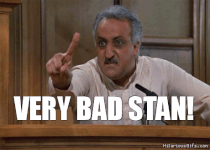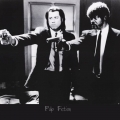http://musiccourtblog.com/2014/02/25/em ... -by-album/
Debate has raged for years over Eminem (real name Marshall Mathers): was he successful mainly because he was white? The answer’s yes – but not for the reason you think. His skin colour locked him out of the profitable gangsta rap market, and rapping about crime or drug dealing would have caused many listeners to accuse him of being inauthentic. He couldn’t even drop the ‘n word’ which most rappers throw around like sweets. Instead, he was forced to invent new ways to shock and outrage middle America. Enter Slim Shady.
The twisted alter ego of his stage name Eminem, Slim Shady said and did everything controversial you ever thought about. He baited politicians, outraged parents, made kids laugh and brought in a whole new demographic to rap music. Marshall Mathers also had another trick up his sleeve so not to alienate more hardcore listeners: his ferocious wordplay and rhyming. Casually dropping multi-syllable rhymes into the middle of lines were nothing to him. When his music first came out, they began describing him as one of the greatest white rappers ever. They quickly dropped the ‘white’.
The Slim Shady LP (1999) – The Blueprint
The story behind Eminem’s first album reads like a movie script: an unknown Detroit rapper gets his break by getting producer Dr Dre to hear his tape, and in a matter of months becomes a superstar. However if the Slim Shady LP is any genre, it’s a horror. While playing Slim Shady, Eminem wasn’t afraid to get cynical, provocative and very, very violent. It’s difficult to know what are scarier – the over-the-top gruesome fantasies, or vivid descriptions of being down and out. Nowhere is his dark persona better show than on Guilty Conscience, where Eminem and Dre trade verses as a devil and angel respectively. In the final verse, Em manages to provoke Dre – the former bad boy of rap – into losing his cool, effectively passing the torch onto his protégée.
The Marshall Mathers LP (2000) – The Masterpiece
This is without a doubt his darkest album. With a front cover of him huddled near the fireplace of his abandoned home, it dealt with subjects like his many family problems, drug use and his ‘corruption’ of teenage youth. He was accused of homophobia and misogyny, and did little to convince people otherwise. Even on his poppier tracks, he set out to offend as many celebrities as possible for the enjoyment of his listeners. However, he proved impossible to pin down. Whenever critics were prepare to write him off after his harrowing song about murdering his wife, he would release something like Stan, a touching and tragic tale of a deranged fan. His incredible wordplay and rhyming abilities were almost a footnote after his song topics. Nevertheless, it remains the best album of his career.
The Eminem Show (2002) – The Political One
After the madness of his last album, Eminem decided he had some growing up to do. That’s not to say it had no sense of humour – far from it – but Eminem was keener than ever to satirise the world at large. He was always a joker, and like Batman’s nemesis, he was skilled at holding up a mirror to society and saying: “You think I’m crazy? You made me this way!” There were still zany moments like Without Me, but the tone on a whole was more mature. He even confronted his troubled relationship with his mother and how rap music can save troubled kids. For most fans, it’s his most personal and powerful album, even if a few weaker songs kept it off the top spot.
Encore (2004) – The Disappointment
Perhaps based on expectations, Encore received rave reviews as usual when it was released, yet listening to it today, it’s hard not to wonder what went wrong. The highlights were his reflective songs – Like Toy Soldiers and Mockingbird – and his anti-Bush rant also deserves a few listens, but everything else verges on terrible. His lead singles still had a juvenile sense of humour but no meaning or purpose. His usually dexterous, quick-witting flow sounded stumbling and amateurish. Most of this was down to his increasing pill addiction which meant he was barely getting two hours sleep a night. If it had been a true encore, it would have been a terrible way to end his career.
Relapse (2009) – The Pretend Comeback
Eminem may have never been subtle, but it was a little on-the-nose to call a record Relapse while as in rehab. Thematically, he resurrected his Slim Shady character and tried to imitate the darker content that had launched his career. However, most songs sounded insincere compared to the passion of his earlier work. Many fans also complained about his constant use of accents. Eminem would later say the last two albums didn’t count as ‘Encore I was on drugs, Relapse I was flushing ‘em out.’ Either way, a slight improvement was good enough for fans after a long break from music.
Recovery (2010) – The Real Comeback
His true resurrection came in 2010 when, finally clean, he set out to work out what a ‘grown up’ Eminem album would sound like. The violent skits and songs poking fun at pop culture were gone – in their place were inspirational songs with positive messages. Both Not Afraid and Won’t Back Down were well received and showed how Eminem had changed his outlook. The lyrics were much tighter, although his duet with Rhianna showed he could still put himself in a dark place when needed. It was more earnest than his earlier work, and he still had the technical skills and wordplay to deliver his message well.
The Marshall Mathers LP 2 (2013) – The Legacy
Sequels usually suggest creative bankruptcy. Nevertheless, with some of biggest producers in music (including Dr Dre and Rick Rubin) behind him, Eminem could hardly fail. He managed to create an organic-feeling continuation of his most acclaimed song, Stan. He also produced some of the fastest, most intricate rapping of his career in Rap God. At one point, he was rapping an astonishing 10 syllables per second – not good for casual listeners, but music to the ears of his core audience. After seven albums and 16 years, he had reached the point where he could legitimately call himself a Rap God.
Eminem – Album by Album
40 posts
• Page 1 of 3 • 1, 2, 3
Eminem – Album by Album
The Matrix Has You






-

yoda you can call me - Under The Influence

- Posts: 4048
- Joined: Oct 14th, '13, 10:47
- Location: Dagobah
- Gender: Male
Re: Eminem – Album by Album
Anyone who thinks Relapse is just a "slight improvement" over Encore needs to actually listen to the lyrics. And saying it isn't "passionate" enough is pretty subjective, although I've always viewed Beautiful and My Darling as some of his most emotional songs.
Besides that, it was a good read. It's interesting to really look back and see how his music evolved as Eminem did as a person. But shit, calling MMLP2 his "legacy" album gives it so much finality. I don't think he'll retire, but just listening to MMLP2 makes me realize Eminem's future is hazier now than it's ever been since his comeback
Besides that, it was a good read. It's interesting to really look back and see how his music evolved as Eminem did as a person. But shit, calling MMLP2 his "legacy" album gives it so much finality. I don't think he'll retire, but just listening to MMLP2 makes me realize Eminem's future is hazier now than it's ever been since his comeback

- Lost Myself
- Closet Cleaner

- Posts: 29
- Joined: Nov 24th, '12, 07:04
Re: Eminem – Album by Album
Nice read. I agree with almost everything written there.
-

RSoares - Soldier

- Posts: 1663
- Joined: Jul 18th, '13, 16:46
- Location: Lisbon, Portugal
Re: Eminem – Album by Album
I've never -- creatively -- seen or heard of an artist delivering their greatest work and follow it up with total shit.
The Eminem Show, 8 Mile (both soundtrack and movie), dominant victories over an entire label (the inc) and a fucking publication (the source) and then...Encore.
Seriously what the fuck. Never in my life I've seen this.
I don't just blame him, as he was under the influence of a lot of drugs as we now well know - I blame Paul, Dre, Jimmy -- anyone who heard the album and thought it was a respectable follow up to Eminem Show.
I'll never get over that shit.
The Eminem Show, 8 Mile (both soundtrack and movie), dominant victories over an entire label (the inc) and a fucking publication (the source) and then...Encore.
Seriously what the fuck. Never in my life I've seen this.
I don't just blame him, as he was under the influence of a lot of drugs as we now well know - I blame Paul, Dre, Jimmy -- anyone who heard the album and thought it was a respectable follow up to Eminem Show.
I'll never get over that shit.

-

VINTAGƎ - Soldier

- Posts: 527
- Joined: Oct 20th, '13, 08:52
-

yoda you can call me - Under The Influence

- Posts: 4048
- Joined: Oct 14th, '13, 10:47
- Location: Dagobah
- Gender: Male
Re: Eminem – Album by Album
Relapse < Encore
Encore had some meaningful songs about himself, Relapse was murder-horrorcore, with all fake songs.
Encore had some meaningful songs about himself, Relapse was murder-horrorcore, with all fake songs.

Singin' "Bagpipes from Baghdad" again
In my dad's drag draggin' a faggot in a Glad bag
Won't be the last time I make a dramatic entrance like that again
You thought I was lyin' when I said I think that I'm crossin' the line again
I've lost my mind, caution oh God I think I've just thought of another fucking line
Forgive me father, for I have sinned
But hip hop has left me brainwashed with a violent streak
-

Jaba - Soldier

- Posts: 1816
- Joined: Oct 12th, '13, 02:42
- Location: The Hospital trying to find a Brain...
- Gender: Male
Re: Eminem – Album by Album
However if the Slim Shady LP is any genre, it’s a horror.


Do people who write this shit even listen to the stuff they're talking about?
Canning: What will it say on your tombstone?
Charlie Sheen: Something dot com.
Canibus & Eminem Converse: http://www.youtube.com/watch?v=rWB62t2_wJE
Charlie Sheen: Something dot com.
Canibus & Eminem Converse: http://www.youtube.com/watch?v=rWB62t2_wJE
- EminemInsider
- Soldier

- Posts: 1197
- Joined: Nov 15th, '08, 04:17
Re: Eminem – Album by Album
Brainless wrote:Relapse < Encore
Encore had some meaningful songs about himself, Relapse was murder-horrorcore, with all fake songs.
UUUUUGGGHHH - Eminem

My Last Shoutout - My Last Will
http://forum.trshady.com/viewtopic.php?f=29&t=175438
So kids, am I worth it ? Did I put enough work in ?
#GiveCanadaPureTheDick | 04.12.2014 - The day TR was closed forever
We are here now --> http://www.hiphopshelter.com
-

Notalius - Band Leader

- Posts: 5578
- Joined: Jul 26th, '12, 21:21
- Gender: Male
Re: Eminem – Album by Album
Menzo wrote:EminemInsider wrote:However if the Slim Shady LP is any genre, it’s a horror.


Do people who write this shit even listen to the stuff they're talking about?
I think the writer might be trying to say that he did such a good job of balancing 'real' lyrics from his obviously exaggerated ones that it was almost horrific for first time listeners back then because the lines were blurry and you couldn't tell if he was joking or not.
Yeah, I could see someone who listened to the album because they heard 'My Name Is' being completely taken aback after hearing '97 B&C. The album was pretty dark, so it's not totally wrong.

Miller wrote:
I'm gonna be pissed if Em finally beefs again and it's with fucking Iggy.
-

Coulter - Soldier

- Posts: 575
- Joined: Dec 20th, '11, 18:32
- Location: United States
- Gender: Male
Re: Eminem – Album by Album
Yoda wrote:Let it go, you must, my little padawan
Am trying.

Still though.


-

VINTAGƎ - Soldier

- Posts: 527
- Joined: Oct 20th, '13, 08:52
Re: Eminem – Album by Album
Great read
Thanks Yoda
Thanks Yoda
-

shadyblogger - Under The Influence

- Posts: 4145
- Joined: Nov 19th, '13, 02:50
- Gender: Male
Re: Eminem – Album by Album
VINTAGƎ wrote:Yoda wrote:Let it go, you must, my little padawan
Am trying.
Still though.

Shadyblogger wrote:Great read
Thanks Yoda
NP

The Matrix Has You






-

yoda you can call me - Under The Influence

- Posts: 4048
- Joined: Oct 14th, '13, 10:47
- Location: Dagobah
- Gender: Male
Re: Eminem – Album by Album
Good read!
" Life can change your directions, even when you ain't planned it
All you can do it handle it, worst thing you can do is panic
Use it to your advantage, avoid insanity manage
To conquer, every obstacle, make impossible possible
Even when winning illogical, losing is still far from optional.." -T.I.
All you can do it handle it, worst thing you can do is panic
Use it to your advantage, avoid insanity manage
To conquer, every obstacle, make impossible possible
Even when winning illogical, losing is still far from optional.." -T.I.
-

TheBoss123 - Soldier

- Posts: 1169
- Joined: Oct 11th, '13, 01:26
- Location: Planet Zebes
- Gender: Male
Re: Eminem – Album by Album
Raul wrote:Encore = disappointment?
smh fuck this article
You're hilarious. They actually went extremely easy on that piece of trash album.
Should've called it "Encore- Absolute Garbage"

jinofthewind wrote:And Koolo's sources said... Nothing you idiots Koolo's sources are dead they're locked in my basement
"Soon as I stopped saying I gave a fuck
Haters started to appreciate my art
And it just breaks my heart to look at all the pain I caused
But what am I gonna do when the rage is gone?
And the lights go out in that trailer park?"
-

Mr Change - Under The Influence

- Posts: 4397
- Joined: Jun 16th, '11, 03:21
- Gender: Male
40 posts
• Page 1 of 3 • 1, 2, 3
Who is online
Users browsing this forum: Bing [Bot]

